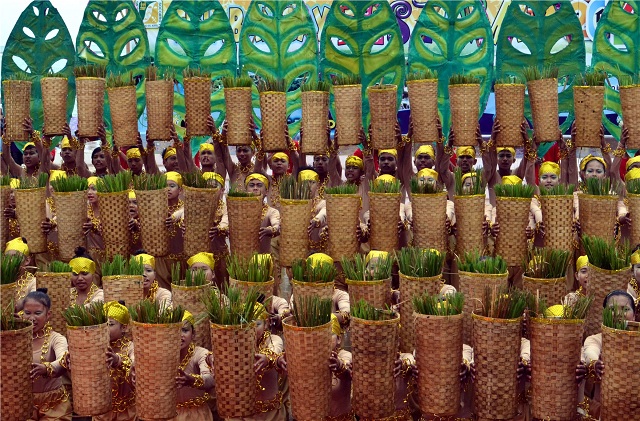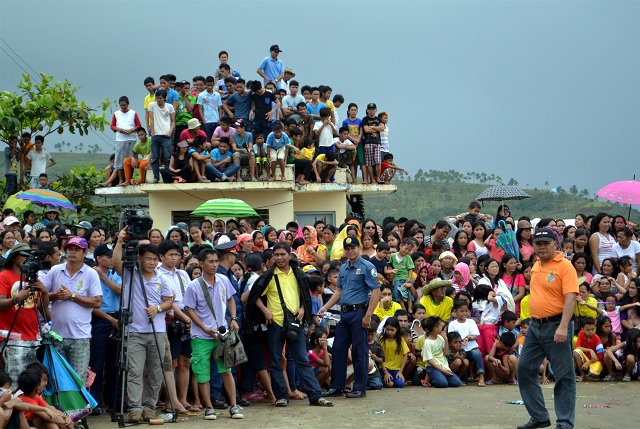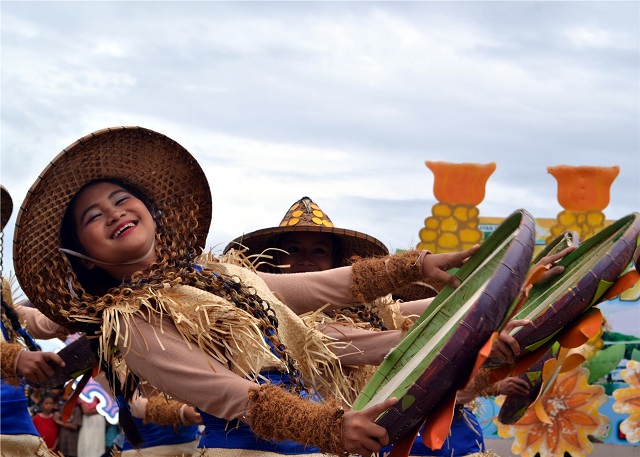ADVERTISEMENT
Filtered By: Lifestyle
Lifestyle
Bayanihan comes alive at Surigao del Norte’s Tinabangay Festival
Text and photos by HENRYLITO D. TACIO

It rained on the day of the Tinabangay Festival in the town of Socorro, Surigao del Norte, but nothing could dampen the spirits of the residents and the visitors who came together to celebrate one of the values Filipinos have become famous for.
The festival, held on Feb. 22, was part of the town's celebration of its 53rd anniversary. On that day, thousands of people flocked to the seaport to witness the showdown of six performing teams participating in the much-awaited event. “This is the first time we really had something like this as lively and colorful,” said one resident.
Every time a team performed, it would rain. Unfortunately, the spectators were not allowed to use umbrellas so as not to block the sight of the people behind them. As a result, most of the audience ended up soaked, but they didn’t mind it at all.
“This rain is a blessing,” the master of ceremony told the audience.

The festival, held on Feb. 22, was part of the town's celebration of its 53rd anniversary. On that day, thousands of people flocked to the seaport to witness the showdown of six performing teams participating in the much-awaited event. “This is the first time we really had something like this as lively and colorful,” said one resident.
Every time a team performed, it would rain. Unfortunately, the spectators were not allowed to use umbrellas so as not to block the sight of the people behind them. As a result, most of the audience ended up soaked, but they didn’t mind it at all.
“This rain is a blessing,” the master of ceremony told the audience.

Although people were not allowed to use umbrellas, the members of the media who covered the event were allowed to use theirs so that their cameras wouldn’t get wet.
“Believe it or not, this is the first time media is covering this event,” said Socorro Mayor Denia T. Florano at the press conference held the night before. “We are very happy that despite your busy schedule, you have given time to come here.”
Help
"Tinabangay" is derived from the word "tabang," which in the local dialect means "help." Tinabangay simply means "helping each other"—in other words, bayanihan.
Tinabangay "acknowledges the values that are concretely practiced here in Socorro," said Domingo Bulabog, who conceptualized the festival in 2003.
"Among Filipinos, bayanihan means helping each other during calamities, when there is a house to be transferred, when death comes to a family, and in other instances where there is a need for collective help," he added.

“Believe it or not, this is the first time media is covering this event,” said Socorro Mayor Denia T. Florano at the press conference held the night before. “We are very happy that despite your busy schedule, you have given time to come here.”
Help
"Tinabangay" is derived from the word "tabang," which in the local dialect means "help." Tinabangay simply means "helping each other"—in other words, bayanihan.
Tinabangay "acknowledges the values that are concretely practiced here in Socorro," said Domingo Bulabog, who conceptualized the festival in 2003.
"Among Filipinos, bayanihan means helping each other during calamities, when there is a house to be transferred, when death comes to a family, and in other instances where there is a need for collective help," he added.

The performances of the six competing contingents emphasized the practice of tinabangay—one acted out a house being built by a group of neighbors, another showed people planting and harvesting rice together.
In this fifth-class municipality, bayanihan is both a necessity and something that comes naturally to the people. According to municipal agriculturist and designated municipal administrator Edelito C. Sangco, every year residents leave their homes for a month to extend help to a needy person or family.
“Able-bodied men have to leave the privacy of their lives and offer their labor services for free in house construction and collective activities,” Sangco said. Women, on the other hand, "assist house and farm owners in preparing the most delicious and nutritious foods and beverages to ease the workers’ weariness and quench their thirst and hunger." — BM, GMA News
In this fifth-class municipality, bayanihan is both a necessity and something that comes naturally to the people. According to municipal agriculturist and designated municipal administrator Edelito C. Sangco, every year residents leave their homes for a month to extend help to a needy person or family.
“Able-bodied men have to leave the privacy of their lives and offer their labor services for free in house construction and collective activities,” Sangco said. Women, on the other hand, "assist house and farm owners in preparing the most delicious and nutritious foods and beverages to ease the workers’ weariness and quench their thirst and hunger." — BM, GMA News
More Videos
Most Popular




